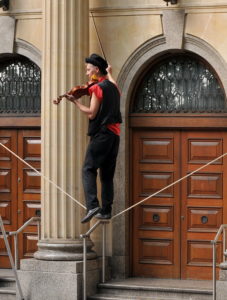 To be in control suits our society – actually, the working system is built upon governance, rules and control.
To be in control suits our society – actually, the working system is built upon governance, rules and control.
Like with traffic: clear borders and signals ensure safety and create flow through good coordination. Without it, chaos can arise: horrendous accidents or angry stand-stills with honking all around. It’s dangerous without control – the greater the energies behind contact surfaces, the worse the outcome!
Self-control: inside matches outside
In the human body, life functions and forces are controlled by a steering system consisting roughly of brain, nerves and the hormonal system. Sensory organs provide input about the situation which we need to adapt to, or which we look to change to suit our needs. Success in this adaptation gives us feedback and maintains the flow or homeostasis and by that, also our happiness and health. The meaning of a governing system in a living organism is self-control to a large extent!
In order to prevent just reacting and be knocked like a billiard ball in a pool table, humans can use cognitive processes like memory and learning, to avoid danger and to reach our goals. These skills are assigned to the cerebrum and especially it’s frontal lobes which are highly developed. We identify with our intellect, our creativity and our free will. We often appoint human achievements to these values. Through them, we are godlike beings. I am proud of my own accomplishments, of an invention, of seeing through a system – even of writing this blog article 🙂
What I’m not proud of is a test of my will power – when I should make myself do something.
Research about will power
In studies with kids (the famous Marshmallow test and with college students) scientists found out, when and why self-control doesn’t work.
Observe what the kid is doing in the end. What could we deduce from this behaviour?
Children from disadvantaged backgrounds showed poorer results regarding resisting the temptation of quick satisfaction. They acted in habitual survival mode – immediate gain matters!
The students’ reactions, whose stress-levels and strategies for everyday stimulants and temptations were followed over a longer period of time, showed that by internal conflicts like seeing a piece of chocolate or cake while wanting to lose weight, the success rate was very low. The students that often fought battles to conquer their “weaker self” not only didn’t acquire their goals better, they even felt drained of energy by the conflict.
Forced control, although meaningful to prevent escalation, proves to work unsatisfactory in the long run and does not promote health. The students who showed a high success rate in withstanding temptation, didn’t experience the inner conflict – thus they didn’t need self-control!
Hunger vs fasting
Two women, Greta and Kate, want to lose weight. Greta doesn’t allow herself to enjoy a treat, eats only half rations, must deny herself sweets, doesn’t treat herself with cream in her coffee… With all these associations of scarcity, her body goes into survival mode which makes her body utilize the food energy even more efficiently. Greta has constant feelings of hunger, which keeps her energy stores open for uptake. She feels moody, weak and vulnerable. After the diet, the scarcity-efficiency program is installed in her body and she even gains weight.
Kate makes it a ritual to treat her body and cleanse it by fasting. She takes her time to combine that with many joyful experiences, like luxory baths, meditating, reading and walks. She notices how her sense of smell gets honed. Kate is happy about all the little changes she perceives in herself and in her world. After the first day of fasting, she hardly feels any hunger because she entered a new mode. Kate is thrilled by the experience that her body and mind can thrive even without all the food. The lightness she gets to know on both levels becomes a new orientation that she takes with her after ending the fasting.
Our body reacts upon the evaluation in the emotional brain, and that is primed by the general feeling of safety, by fantasy, capacity for enthusiasm, attention, curiosity and trust.
What really matters
 we learn from people with high efficiency and body control: the rope dancer doesn’t think of the abyss beneath him. He is focussed and merges with his aim, as with the rope under his feet, and negotiates time and space. Everything else is just unimportant. Every one of us knows this state, where we are so absorbed we ignore everything else and just are “in flow”! Just as kids that play and explore.
we learn from people with high efficiency and body control: the rope dancer doesn’t think of the abyss beneath him. He is focussed and merges with his aim, as with the rope under his feet, and negotiates time and space. Everything else is just unimportant. Every one of us knows this state, where we are so absorbed we ignore everything else and just are “in flow”! Just as kids that play and explore.
Even if this is not the state where most of us spend the majority of our day: we can learn from playing children! Intrinsic motivation, when the „beneficial“, the goal-oriented actions also feel like fun, boosts our chance to not produce inner conflict and to have success.
Whether the focus is on the temptation (the chocolate) or on the goal next to it is also important. Energy follows attention. Just as rope dancers don’t think of the abyss, and car drivers don’t think of the ditch: instead, they use the input from the environment and their imagination to let the body adjust perfectly all by itself.
People with „effortless self-control“ installed helpful habits. For me, a morning run is a ritual making me feel fit and creative. I like fresh food and so it’s easy to visit the local market once a week for the veggies I don’t get from my garden. A mini-trampoline is at hand to interrupt sitting between working sessions. This is just to illustrate how “good habits” can be established as regular routines – whatever they may be in your case!
Summary:
Scientific studies and own experiences confirm design principles of permaculture! The desired activities should
- be made simple
- be integrated into procedures already in use
- provide a value/gain (fun, community…)
- be supported by the environment
- have a model in nature
- incorporate own likings, talents and needs
When taking these into account, the “traffic coordination” in life can become uncomplicated, because resistance is low and motivation is in place.
Study how biological programming impacts mental and physical health, and become a pathfinder to well-being!
First published in German on META-Evolution Blog
picture sources: Wikimedia Commons / User böhringer: https://commons.wikimedia.org/wiki/File%3A%C3%96sterreichische_Bundespolizei_02.jpg, pixabay
 META-Healthy Life articles are created by professionals and friends of META-Health International CIC, supporting individual and global health by deepening and sharing our understanding of how resilience and well-being are achieved.
META-Healthy Life articles are created by professionals and friends of META-Health International CIC, supporting individual and global health by deepening and sharing our understanding of how resilience and well-being are achieved.